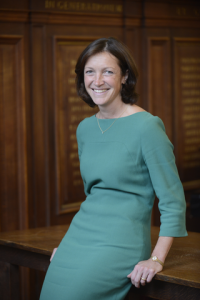
Wolverhampton Grammar School, an independent co-ed school, is rated one of the best in the country. Headteacher Kathy Crewe-Read discusses the ‘excellent’ rating the school recently received from the ISI and considers the role of the school’s ethos in this – an ethos which focuses not just on attainment but also on developing students who are ready for the future – an approach which the new ISI framework celebrates
 Not only is Wolverhampton Grammar School rated one of the best in the country it’s also one of the oldest – founded in 1512. Whilst it has a strong academic tradition, headteacher Kathy Crewe-Read is quick to note that the school also has a strong spiritual tradition. “For the last century there’s been quite a strong tradition of young people speaking out about what’s important to them – the student voice has, for a very long time, been taken seriously here.” This is something that makes Wolverhampton a great place to work, says Kathy, because, not only does the school’s community listen to each other, and each other’s opinions, they also take notice of them – a characteristic and a strength that helps create a robust community, a key attribute that was picked up on in their recent ISI inspection.
Not only is Wolverhampton Grammar School rated one of the best in the country it’s also one of the oldest – founded in 1512. Whilst it has a strong academic tradition, headteacher Kathy Crewe-Read is quick to note that the school also has a strong spiritual tradition. “For the last century there’s been quite a strong tradition of young people speaking out about what’s important to them – the student voice has, for a very long time, been taken seriously here.” This is something that makes Wolverhampton a great place to work, says Kathy, because, not only does the school’s community listen to each other, and each other’s opinions, they also take notice of them – a characteristic and a strength that helps create a robust community, a key attribute that was picked up on in their recent ISI inspection.
Earlier this year the ISI visited the school and left behind their highest possible rating. Wolverhampton has been judged ‘excellent’ across all areas with inspectors remarking that, ‘By the time they leave school, pupils are well-equipped for their future lives. They are effective learners, keen participants, socially aware and keen to make their positive contribution to the world ahead.’
What is the cornerstone of such an outstanding report? According to the ISI it is – in part at least – a ‘…community that inspires openness, trust and mutual respect’. We spoke to Kathy about how they create this environment in the school.
Your mission is ‘To deliver education that transforms lives as well as minds’. How do you achieve this?
In schools, as in everything, there are numerous small ways that one finds opportunity to meet one’s vision statement. In terms of exciting intellectual curiosity we spend a lot of time working on our teaching, the learning that this creates and putting in place intellectual clubs outside of the normal taught curriculum to stimulate children’s interest.
But the making a difference to lives – transforming lives – is really about providing as many opportunities as we can for children to involve themselves in any form of active service, giving them opportunities to make a difference to people’s lives in this school or, indeed, outside the school. We also aim to give students as many opportunities as we can to speak out confidently about things that matter to them, so that they know how to articulate things that are difficult, as well as things that are easy.
How do you ensure a balance between academia, arts and sport – and the ‘rounded’ child is achieved?
That’s through careful monitoring of what students are doing. Our staff know the students really well; our form tutor groups are relatively small and the form tutors spend plenty of time with the students – talking to them and getting to know them – so they know which activities they’re involved in and they know each student’s spread of interests.
Form tutors also ‘tie the knot’ between student and their parents. When that relationship is really strong then I feel that both school and parents are working together to create, if you like, rounded children – to use your expression. We spend a lot of time talking to parents; we have an open-door policy at a high strategic level, as well as at form tutor level, so students and their parents can know and be confident that, when they say something to us, we listen. This openness relates to school issues as well as the individual student’s experience – it’s all taken seriously.
So, it’s to do with relationships, really. The students know and trust the staff; they have fantastic relationships and they want to please them and do their best for them. This means that, whatever activities young people are involved in, they’re trying to give us their best.
The school prioritises openness, trust and mutual respect. What part do you think this plays in maintaining its standing?
The flexibility is important because every child is different and we have to get it right for every child. Whilst most of our children do take a pretty traditional route through school there are some who, for whatever reason, need something different. We are able adapt the curriculum to meet their needs and we always take that seriously; we always try to take decisions that are right for each child and for each family.
Again, it’s to do with trust. We all know that we’re working towards one aim – to try and transform each child’s life and mind. To this end we have to trust each other and work confidently with parents to enable us to do that.
What approach to leadership do you take at the school?
The senior management structure is relatively traditional. The only difference, I think, in our senior management structure to that of many schools I’ve worked in is that we don’t split the academic from the pastoral in terms of management and leadership in the school. For example, my two deputy heads are responsible for the pastoral and academic welfare of year groups of children. This is because we believe you can’t split pastoral and academic; they are individual children and each one effects the other.
Another aspect is that we work very hard to make it clear to students, and all of our community, that there isn’t really any divide between teachers and professional support staff and that every member of our community has to play their part in fulfilling our vision. Communicating the vision, and making sure that everyone believes in that vision, is fundamental to our success because we all want the same thing for the young people.
Being a leader isn’t about asserting your own opinion; it’s about communicating a shared vision and galvanising enthusiasm and expertise to pursue that vision.
How did you find the new inspection framework?
I thought there were some really good aspects to the new ISI framework – and there were some things that enabled our school to shine through. For example, the emphasis on outcomes rather than provision is just fundamentally important because it is about making a difference to children’s lives. It’s easy for schools to lay loads of stuff on, but does it make a difference? Asking that, I thought, was a really positive part of the new inspection framework and one which enabled us to measure ourselves favourably. It’s quite salutary to sit down and say, for example, ‘Well you’ve got a new debating club’ but it’s then important to question what difference does that make to the children’s lives.
It was also fantastic that when the inspectors came to see us they showed a determination to understand our school’s ethos and measure our progress against our own aims; that’s something that the inspectorate should be proud of.
Both ISI and Ofsted spend a lot of time on compliance, and every school wants to comply, that’s the bread and butter that goes on in the background, if you like. With Ofsted, you’re talking about the quality of education and I don’t think that you can’t split achievement from the development of personal qualities. In this respect ISI has gone one step further and it’s a good thing as far as I’m concerned.
Don’t forget to follow us on Twitter and keep up-to-date with the latest news and features
